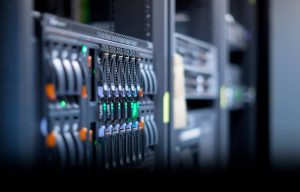Different Types of Servers
When it comes to setting up a server in your business, you have plenty of options to choose from. Here, we’ll cover a few different types of servers and how they could benefit your company.
Physical Servers Types
Rack Servers
Rack mount servers are the most common server type for medium or large sized businesses. Rack-mounted servers are designed with scalability in mind. They come in a standard width and in varying but standard heights so that they’re easily mountable in a rack, providing a lot of processor power in a small footprint. Most rack servers are highly expandable, which also means they are typically more expensive than their tower counterparts. Since rack servers are typically mounted in close proximity, they usually require a climate-controlled environment when you install multiple servers, which is why many companies create separate rooms to house their server racks or computer rooms.
Tower Servers
Tower servers may look similar to a desktop computer, but generally have higher grade of components designed to run server applications. They can be less expensive than a rack mount servers, and are good for small businesses when you only have one or two servers.
Just like desktop computers, the price can vary greatly, depending on what type of hardware installed in the system. Depending on their configuration, tower servers can share files and host other services, such as Microsoft Exchange Server, Active Directory and more. Unfortunately, tower servers don’t scale very well, so if your business has rapid growth, you may want to consider a rack solution.
Network-Attached Storage
Network-Attached Storage (NAS) in and of itself isn’t necessarily a server, but it is a great, low-cost way to share files over your company’s network. A NAS is much like an external hard drive, except that it has the ability to connect directly to your network and share files without an additional server. This is a good option when you need to quickly and easily add file storage to your infrastructure.
Virtual Servers
Virtual servers can run on either physical or cloud servers, and can share hardware and software resources with other operating systems. Virtual servers are a means to run multiple environments on one piece of hardware. Virtual servers work on your own server hardware, or in the cloud.
By partitioning physical servers, into a number of virtual environments, companies can save money on purchasing hardware, software licensing, and support.
Cloud Servers
Cloud servers are typically virtual servers, or shared services, that allow you to lease server space or usage from a third party. The joke in our industry, is that the cloud doesn’t actually exist, it’s just someone else’s server.
Some advantages of running servers in the cloud include:
- Fixed monthly cost
- You don’t have to worry about software licensing
- Cloud servers allow for quick scalability as your business demands change
If you’re ready to learn more about how adding a server will benefit your small business, Minneapolis-based OAC Technology can help. For more than 10 years, we’ve been helping businesses with Server Support, ensuring that their systems are up-to-date and secure. Give us a call at 952-548-5558 and we would be happy to sit down with you for no charge and assess your business’s needs.




